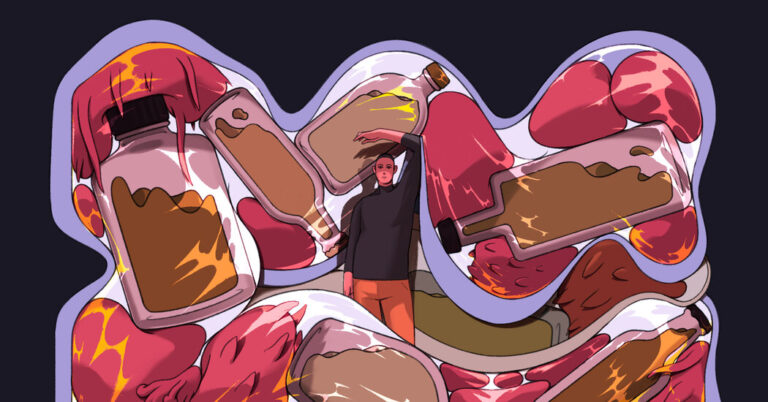A bubbly beer or glass of wine complements your meal and is soothing. But what effect does alcohol have on the trillions of microorganisms that live in your gut?
As with much of microbiome science, “there's a lot we don't know,” says Dr. Lorenzo Reggio, a physician-scientist who studies alcohol use and addiction at the National Institutes of Health.
That being said, it's clear that happy microbes are essential for proper digestion, immune function, and gut health. And scientists are beginning to study how drinking affects the gut, and are learning that drinking too much can have unfortunate consequences.
How does heavy drinking affect the microbiome?
Dr. Cynthia Hsu, a gastroenterologist at the University of California, San Diego, says most of the available research on alcohol and the microbiome focuses on people who drink heavily on a regular basis.
For example, a small number of studies have shown that people with alcohol use disorder (an inability to control or stop problematic drinking) often have an imbalance of “good” and “bad” bacteria in their guts. I know that. This is called dysbiosis, and is generally associated with greater inflammation and disease compared to a healthier microbiome, Dr. Hsu said.
Reggio says that heavy drinkers with dysbiosis may have “leaky”, or more permeable, intestinal linings. A healthy intestinal lining acts as a barrier between the inside of the intestine, which is filled with microorganisms, food, and potentially harmful toxins, and the rest of the body, he said.
When the intestinal lining is destroyed, bacteria and toxins can escape into the bloodstream and into the liver, causing inflammation and damage to the liver, Dr. Hsu added.
Dr. Jasmohan Bajaj, a hepatologist at Virginia Commonwealth University and the Richmond VA Medical Center, said preliminary research suggests that an unhealthy gut may even contribute to alcohol craving.
For example, in a 2023 study, researchers looked at the microbiomes of 71 people between the ages of 18 and 25 who did not have alcohol use disorder. Those who reported more frequent binge drinking (defined as four or more drinks within about two hours for women and five or more drinks for men) showed changes in their microbiome that correlated with stronger alcohol cravings. . The study also adds to previous research that found binge drinking was associated with increases in blood markers of inflammation.
However, none of these studies have proven that alcohol causes dysbiosis in humans. While the association is more obvious in animal studies, human studies make it harder for researchers to control for factors such as diet and other health conditions.
What happens to people who drink less?
Federal guidelines define moderate drinking as no more than two drinks per day for men and no more than one drink per day for women. Jennifer Barb, a clinical bioinformatics scientist at the National Institutes of Health, said there is little research into how this amount of alcohol consumption affects the gut microbiome.
Scientists have found that compared to people who don't drink at all, people who drink low to moderate amounts have a more diverse gut microbiome. This is a property commonly associated with a healthy gut. This could be due to other dietary or lifestyle factors, or it could be something in alcoholic drinks that benefits the microbiome, but it's likely not the ethanol, Barb said. said.
For example, a 2020 study of 916 British women who drank two or fewer drinks a day found that women who drank red wine (or, to a lesser extent, white wine) had more intestinal It was found that bacterial diversity was high. No such association with beer or liquor was found. The researchers hypothesized that polyphenols, compounds found in grape skins that are found in high concentrations in red wine, could explain the results.
But John Cryan, a neuroscientist who studies the microbiome at Cork University in Ireland, says you don't need alcohol to find polyphenols. Polyphenols are also found in grapes, most other fruits and vegetables, many herbs, and coffee and tea.
In general, consuming a variety of plant-based and fermented foods such as yogurt, kombucha, and kimchi can also improve microbiome diversity.
Can cutting back on alcohol improve your gut health?
Barb said that when researchers looked at the microbiomes of people treated for alcohol use disorder, they found that within two to three weeks of stopping drinking, the gut bacteria began to show signs of recovery, and the intestinal lining It turned out that it had become hard. There will be less “leakage”. But people who receive treatment for alcohol use disorder typically also eat healthier and sleep better, and can improve their gut health, she added.
Dr. Reggio said it's not clear how or whether quitting or reducing alcohol will affect the microbiome of moderate drinkers. However, we do know that alcohol can cause acid reflux, inflammation of the stomach lining, and gastrointestinal bleeding, and may increase the risk of several types of cancer, including those of the esophagus, colon, and rectum. he added.
So there is “no question” that cutting back on alcohol consumption is a worthwhile endeavor for your health, Dr. Reggio said.


